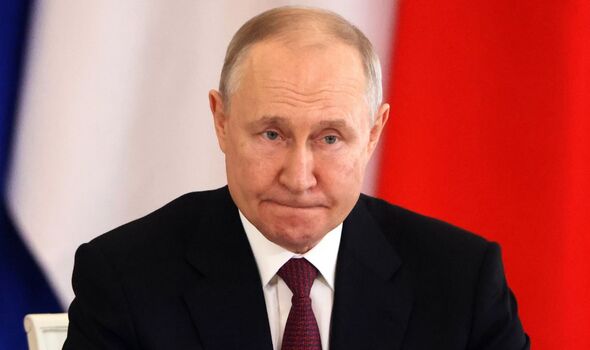Russia’s economy is poised to plunge to record lows during Vladimir Putin’s fifth presidential term in a devastating blow for the Kremlin, daming new forecasts have shown.
The share of global gross domestic product (GDP) in the Russian economy is expected to plummet between now and 2029 to the lowest levels seen since the Soviet era.
In April, the IMF had forecast that its GDP would grow faster than all other advanced economies in a shocking prediction.
The 3.2 percent rate of growth predicted for this year placed it significantly above the UK, France and the US.
The IMF said: “Despite many gloomy predictions, the world avoided a recession, the banking system proved largely resilient, and major emerging market economies did not suffer sudden stops.”
IMF data suggests that Russia‘s share of global GDP start dipping in 2025. That year, it will hit 2.908 percent, figures show. By 2026, its GDP share will reach a predicted 2.855 percent, dropping slightly year-by-year.
And by 2029, Russia‘s share of global GDP will plunge to just 2.706 percent. That is lower than levels seen towards the end of the Soviet Union.
The bleak figures come as Gazprom, Russia’s state-owned gas giant, plunged to its worst loss in at least 25 years in a major blow for Putin.
The Kremlin-controlled energy conglomerate saw a staggering loss of 629 billion roubles (£5.5billion) in 2023.
It comes after Russian gas exports to Europe, which was once a hugely profitable revenue stream, plummeted as Western nations issued sanctions and cut energy ties with the Kremlin.
But it is not all doom and gloom for Russia as some analysts say point to its surprise growth this year as a win. For instance, its military industry is expanding amid a boosted workforce in the sector, with at least half a million new employees.
Salaries have also soared from 20 percent to 60 percent since the war began, with many firms offering exemptions from military conscription.
But the price of the war is also putting strain on the Kremlin’s budget, with a third of spending going towards defence.
Meanwhile, a survey commissioned by the central bank in February found that 28 percent of people don’t have enough money for food, or they can buy food but avoid buying clothes and shoes.
